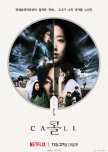
This review may contain spoilers
"Let me tell you the story about the call that changed my destiny..."
The plot of "The Call" as a thriller hinges on the protagonist doing profoundly stupid things to initiate and prolong the conflict between herself and the victim-turned-antagonist. So much that suspension of disbelief fractures the closer the film gets to the end. The lack of rules established for its time travel do what most time travel films do: Throw ideas, like feeling past-tense pain, at the wall.What started out as a cut-and-dry time travel narrative about two women connecting across time, and one of them dealing with an abusive and superstitious mother (whose abuses end up being justified by the story, ffs!), quickly devolves into run of the mill thriller with lot of shrieking and yelling women.
On top of that, the ending invokes a kid kicking a monopoly board and screaming, "You didn't win! You didn't win!" when they're caught cheating. By all means, end on a bad note. But make sure you've actually built a narrative that justifies that sour note, otherwise you risk exposing weak storytelling (which this ultimately is full of).
Performances are decent, and its entertaining enough that it kept me engaged. Overall? Nothing remarkable (especially in terms of time travel movies).
Was this review helpful to you?

This review may contain spoilers
Starts out Strong, Ends with a Whimper
The strength of "100 Days My Prince" lies in how its story was set up (basically its first episode, which was very "War of the Arrows"). The child actors, Jung Ji-Hoon and Heo Jung-Eun really sell blooming friendship between Lee Yool and I-Seo to such a degree, I would've been content just watching an entire show about these kids. The dynamic between the usurped Princess and the unwilling Crown Prince makes for a fantastic foundation for a friends-to-lovers story. Or would've if the writers had chosen to go in any other direction besides the one they chose.The idea behind a boy being foisted into a position of royalty because of his opportunist father and a greedy Lord is, at first, interesting. The idea of an amnesic Prince learning to become a better person is also a great idea. But, the two ideas are at odds with each other. One lends itself to the story the writers were telling, the other is more befitting a "riches-to-rags-to-riches" kind've story like "Anastasia (1999)". Ultimately, it seemed to me that writers were torn on who Lee Yool was supposed to be.
Instead of playing the Crown Prince up as stone-faced, passive-aggressive non-actor who gets pushed out of the political intrigue plot for a romantic side-quest, we could've had a proactive Prince who sought to undermine his father's rule. The show doesn't do enough to explore or develop Lee Yool as an adult, wholly against his father's actions and suffering the consequences of them. His relationship with his father is just never explored beyond his resentment.
The show plays up the nastiness of Lee Yool as set up for a romance that's meant to realign him morally (the amnesia being his punishment, of sorts). The amnesia plot is wholly unnecessary when there's enough conflict between King and Prince, and Prince and Lord, that he needn't be removed from the royal palace setting at all.
The thing that kept me glued to this series from beginning to end was the relationship between the brother and sister, Yoon I-Seo (Hong Shim) and Yoon Seok-Ha (Mu-Yeon). That, and the barely explored relationship between the Kim So-Hye (the Crown Princess) and Mu-Yeon (the brother-turned-assassin). Basically, the hope that the show would delve more into their relationship instead of keeping their dynamics obscured in the margins.
I-Seo and Seok-Ha's promise to each other, the hope to be reunited, and the obstacles that kept them apart was a sixteen episode series unto itself. The Princess, unsatisfied and disinterested in her suffocating life as royalty, falling in love with Mu-Yeon, cliched as it is, at least had some spark to it when one considers her fraught relationship with her father (who threatens her life constantly). I can imagine if this series was just about the three of them, my opinion of "100 Days My Prince" might be much higher.
"100 Days My Prince" feels unfocused. There are so many characters (like the Queen, the second Prince, the Eunuch guy) that fall to the wayside, almost forgotten. Things that characters did at the beginning of the show (full on regicide!) are glossed over and dismissed like no biggie.
So much of it leans on the fish-out-of-water antics of the amnesiac Lee Yool, and placating Hong Shim, and the political intrigue" subplot that goes nowhere. The first only works if you like BOTH characters, and the second doesn't because the show barely develops the conflict between King and Lord.
By the time we reach the last six episodes, like most K-dramas, it's hard to even tell what the story's intentions are anymore (beyond the romantic plot) it becomes so aimless (the war subplot feels like it comes out of left-field). The Yoon sibling relationship, and forbidden love between the Crown Princess and Mu-Yeon gets lost in the dishwater of a muddled story.
Lee Yool is not an interesting character post-childhood. He's bland, and the mostly one-note performance of Do Kyung-Soo (rooted in machismo) makes the show a bore to watch toward the midpoint. The story's attempt to rehabilitate of his character just doesn't work for me overall.
Actress Nam Ji-Hyun does most of the heavy lifting that makes the relationship between Hong Shim and Lee Yool work even a little. She's got a great sense of comedic timing, and her more energetic performances with the supporting cast of villagers is fantastic.
Kyung-Soo's lack of presence just exposes how one-sided their on-screen dynamic often is. Their chemistry is weak, especially when compared to the dynamic Ji-Hyun has with Kim Seon-Ho (Jung Jae-Yoon, the face-blind governor) who plays her supporting love interest.
"100 Days My Prince" isn't without merit or its moments, but the execution of the story was lacking in lot of areas.
Was this review helpful to you?
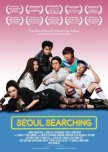
This review may contain spoilers
"Seoul Searching" Emulates John Hughes Just a Little too Well
[Written/Watched 21 Aug, 2020. Expanded 1/21/2021]The idea of a film exploring Korean diaspora is certainly an interesting one, and the whole reason I decided to look into the film. For the most part there film has some fairly interesting moments regarding how divorced and alienated next generation Koreans are from S/N Korean culture and life.
But, outside maybe two characters, there's no real in-depth investigation into that alienation. It's summarized in scenes that directly address the subject, then quickly falls into the background of the 80s soundtrack and teen antics emulating John Hughes scripts (right down to his xenophobia and racism).
There's a moment where Korean-Japanese students are antagonized by our primary ensemble cast, and the two groups have to make amends with each other because their teachers don't want them perpetuating the antagonism of the past (that continues to directly impact both cultures). It got me thinking that the film desperately needed a Japanese-Korean protagonist to actually confront that with any kind of honesty beyond a energetic and flashy fight sequence.
The film's cast are effectively a bunch of broad stereotypes, introduced to the audience in a sort of faux roll call montage that exists just for the reaction shots of (South) Korean citizens cringing at the kinsmen who've lived abroad.
A lot of the characters are never given the opportunity to be humanized. The cast is bloated in a way better suited for a television series. A Black Korean teen, and a tomboy who mistrusts men as a result of an abusive father, got zero face time beyond a few moments that revolve around a Mexican-Korean character, Sergio. Sergio's whole character is that of the "Hot Latin Lover" stereotype who talks endlessly about women.
To be frank, the only characters with a story worth investing in is Klaus Kim (a German-Korean boy who wears expensive suits, characterized as a gentleman, one who ends up cheating on his girlfriend, lmao) and Kris Shutlz (a Korean-American girl who was adopted into a white family after her biological mother gave her up to spare her of an abusive household). They not only feel like human characters, but their individual stories, dynamic and chemistry keeps the film afloat.
The story of the teacher, who put his reputation before the mental health of his son (and family), wants you to empathize with the fact that he was responsible for pushing his son to suicide. I find myself hating the character despite the believably of the performance that communicates immense regret and shame.
A lot of the film is wasted on a Sid Vicious and Madonna stan, and a loud-mouthed military boy. The Madonna stan doesn't do much except reenact Madonna music videos and is used as a plot device in the Sid Vicious stan's angst subplot. The military boy embodies toxic masculinity, homophobia, and racism typical of the era, but is in no way critiqued as incorrect.
All three character subplots converge with an attempted rape scene that's glossed over and forgiven. The issue with these characters is entirely founded in the fact that they only seem to exist as an excuse for Benson Lee to exercise his anti-Blackness, sexism and homophobia.
It's a shame that the film isn't particularly interested in investigating its own anti-Blackness, because that's what really kept me from engaging with the film's narrative beyond Kris and Klaus.
Jamie (the Black Korean girl) is never given the opportunity to be a character, just a reactionary minor character for Sergio. When Sergio ends up paired up with the tomboy character, it seemed, at first, that he and Jamie would remain as friends. At the last minute, Jamie is transformed into shrieking Mean Girl who gets lemonade thrown into her face when she demands to know why the tomboy is moving in on her date, and disappears into the background. There's zero empathy for her.
There are three Korean-American characters who are clearly trying to emulate Run DMC (if not the Beastie Boys). Their entire reason for being in the film is simply to put on a Blackaccent and make a mockery of Black culture (Hip Hop culture specifically) as the writer-director takes every opportunity to flaunt his knowledge of racial slurs with them and the military boy. Once they're no longer needed for comic relief, they're booted out of the film off-screen.
Because the film was written by someone who didn't regard Black culture or its sole Black character with any kind of empathy, there's no one in the story to challenge the blatant racism on display in the film. The Run DMC wannabes are ultimately just as complicit in perpetuating racism as the military boy was, and the dismissal of Jamie.
The movie has its moments, but the problems outweighed the positives for me.
Was this review helpful to you?
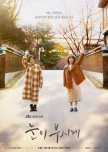
This review may contain spoilers
In Which Time Traveling gets Fairly Angsty about the Passage of Time
"The Light In Your Eyes" is a fairly deceptive take on a woman suffering from Alzheimer's disease that fits pretty well into the how the disease robs people of their memories and sense of self by exploring the idea of an imagined life. Before that, the series masquerades a time travel rom-com about an aspiring announcer who uses a watch that can manipulate time, but accelerates her aging as a price.While not comparable to the likes of Sarah Polley's "Away From Her", the show - toward the end - does get pretty heavy once it reveals it hand and deals with the subject on more than a passing level. If the aim was always to tell a story about aging and how the elderly are treated by their community (on a whole), then hiding it behind a fluffy rom-com was certainly one way to see it through.
However, it gets to a point where that I think the constant barrage of melodrama honestly detracts from the message, and borders on comical (unintentionally) at times.
There aren't a lot of dramas I'd recommend, but if I had to choose a show for someone to watch, I'd choose this one (on the pretense that I'd spoil the twist, because I think knowing beforehand will simply make the story better).
Now if y'all excuse me, I'm gonna watch a salary man fight zombies. I'm sure that won't break my heart.
Was this review helpful to you?
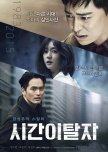
This review may contain spoilers
A Messy Time Travel Story That's Pretty Fun
With a title that invokes invokes 90s fare like "Timecop" or "Sudden Death", Time Renegades is not quite the sci-fi/action B-movie of Jean Claude Van Damme's career peak (but its got that spirit, for sure).Butterfly Effect time travel lay the crux of the film's narrative, which follows a music teacher from the 80s and a detective in the year 2015, attempting to prevent the deaths of 49 students and several women.
Like "Timecop", both characters are driven to save a woman they care about from (certain) death, but the story isn't so predictable that you'll be counting the story beats in chronological order as they come along, but they kinda come out of left field most of the time.
I think the most surprising thing about the story is that the detective actually admits to dreaming about the past like it's the most natural thing in the world, and none of his co-workers call him 'crazy' or 'psycho' (as you do in this genre). They just kinda say, "That's weird, but okay", and go about their day.
Like most K-dramas that introduce a serial killer element into their plot, the writing goes hard on the melodrama (to the detriment of the film), and the villain comes off as unintentionally comedic as the actor mugs, shrieks, and widens their eyes to communicate the character's madness.
The film's tone flip-flops between deadly serious and sustained bouts of comedy (mostly performed by Lee Jin-Wook), all of which is sandwiched between schmaltzy romance and conversations about reincarnation.
"Time Renegades" is a good time for the most part. It's time travel aspect isn't overly flashy, certainly makes a mess of its story (and to such a degree the time travel aspect is really treated like a get-out-of-jail-free card), but the performances are solid, and I think (sans the ending) the story is worth your time.
Was this review helpful to you?
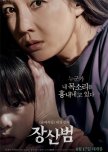
This review may contain spoilers
[Written/Watched 19 Oct, 2019 on Letterboxd.]It's really hard not to think about "The Wailing" when watching "The Mimic" (on Shudder). And that's not to say they're identical films (they're not), but both films feature a character whose good senses fly the coop despite being warned against doing the thing that will doom them.
With "The Wailing", it was kinda understandable. The daughter was still alive (to a degree) and the father acted on instinct instead of wisdom. "The Mimic", however, ultimately argues the mother's grief over her missing (and likely dead) son was stronger than any lasting relationship she could've maintained with her husband and her daughter, their only surviving child. That's bleak as hell, but it suited the tone of the film (which was never particularly optimistic to begin with).
It's kinda hard to view a mythical tiger as a soul-eating antagonist. Largely because "Tigers Are Not Afraid" (a film that uses tiger imagery in a positive light) still hangs heavy in my mind.
Was this review helpful to you?
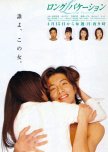
This review may contain spoilers
There's a lot to like about the presentation of "Long Vacation" and watching it across the span of a couple weeks, I can see why it has the reputation it does among J-drama fans (or, on a more historical note, why it was even called "The King of Ratings" (IIRC) at one point during its run in 1996). It's easy to get into and easy to stick with. There was not a moment where I wanted turn away.As a story, I think I appreciate what it does with Hayama Minami's arc, which is primarily why I stuck with the show from start to finish. Pardon the comparison, but Yamaguchi Tomoko's got a real Sandra Bullock quality to her. It's not hard to fall in love with her journey, and she brings a real personable energy to Minami's story.
I appreciate that "Long Vacation" doesn't dwell on the absence of her would-be husband and instead commits to seeing the character grow past that heartbreak. It really highlights one of the issues with the romance genre in general. The need or desire to give so much time to the character who stranded the protagonist in the hole she has to crawl out of instead of just the person harmed.
By the end of it, I never really cared if she ended up with Sana (in fact, I rather wish she had stayed with Mr. Sugisaki if she was gonna be with anyone), but I liked how the story ended things with them. I was glad to see the character reach a point where she was content with herself. I ultimately appreciated Minami and Sana's friendship more than the idea of their romance, which never really gets a chance to develop like their friendship. (A lot of the "will they/won't they" of the story put too much onus on Minami to act versus Sana, who played around with her too much in my opinion.)
Sana's struggle as a creative is something I could sympathize with. The indecision, the fear of failure, and the pursuit of perfection (almost throwing everything away and subjecting yourself to the unhappiness of life without the thing you love), and how all of that impacts your external relationships (oftentimes for the worse), are all captured nicely in his arc. His indecision is frustrating a lot of the time, but rooting for him wasn't hard (even when I wanted smack him upside his head).
If there's anything I don't like about "Long Vacation" it's how antiquated a lot of the character's thinking is (and how that thinking remains a viral constant in other modern dramas). Minami is constantly dogged for being in her 30s, which is treated like a death sentence. More than one male character (but specifically Sana) employs the virgin/whore dichotomy against her because she doesn't act like the "delicate", "pure (as snow)", and "polite" girl.
While the show excels in trying to paint (romantic) relationships with honesty, it falls back on the tired "men and women will never understand each other" shtick, and it's clear the writers don't have the perspective (knowledge) to really tackle that problematic line of thinking.
The show is also insistent on excusing Minami's brother (Shinji) on a "boys will be boys" basis when he cheats on his girlfriend Ru, then has the gall to call Ru "spoiled" because she acted on her anger towards him. As supporting characters, Ru and Shinji suffer the most because so little time is afforded to them (and honestly, after how the first episode set them up, that's a shame), and the 'love triangle' that jammed into their subplot makes thing worse.
Momoko is a particularly irksome character who acts as the show's summary of its thesis. She's mostly played up as adorkable and loveable, but she just exasperated me, honestly. After Momoko, I don't like the Ryoko character. She encapsulates so much about what I don't like about love triangles. In general she's an empty character who only seems crucial to the show when someone she's dating falls out of favor with her (or vice versa). At best, she magnifies the issues that plagued most of Minami's relationships with men, who treat Ryoko as infallible on the basis that she's the "ideal" that women like Minami should aspire to.
Overall, I think "Long Vacation" gave me everything something like "Good Morning Call" failed to as an awkward story about cagey roommates who become lovers (GMC is also just a messy adaptation of a solid manga). It falls short of being great because of the problems I pointed out, but it doesn't damage the overall experience with the show itself. Great performances and character dynamics kept everything afloat for me.
Was this review helpful to you?

This review may contain spoilers
A Solid Action Film Driven by Human Drama
[Written Watched 09 Jul, 2019 for Letterboxd]Jung Byung-gil's "The Villainess" straddles the fine line of romantic drama and revenge flick with a kind've ease I don't think I've ever seen in an action flick. The dubious relationship between a woman who was raised by a man who seemingly rescues her from a murderer who kills her father, drives much of the protagonists' actions (almost to the point where it begins to feel as though she has no real agency beyond manipulation she is clearly blind to).
The message in the end is that the often overly melodramatic human drama is more important than the violence, and the violence feels all the realer because the script cares about how it impacts its characters.
For all the spectacle that is the film's ability to weave prolonged action sequences together in sharp, frenetic editing that keep up the momentum of the sequence with camera tricks, the choreography really makes the action stand above even the most rote of action movies. It's no wonder the director of "John Wick Chapter 3" lifted an entire action sequence from this film.
Was this review helpful to you?
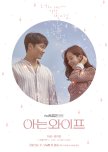
This review may contain spoilers
A Fairly Frustrating Experience When Rooting for the Heroine
[Written 2/2/2021]Time travel often asks, "If you could change anything in your life, what would it be?" Time travel romance loves to ask, “If you could trade one sweetheart for another, would you do it?”
The moral quandary of romance and time travel focusing on the idea of "fated lovers", typically ask us to sympathize with men who pursue women they like, all while discarding the agency of the female protagonist (who becomes an object or prize won at the end of the story). Temporal romances range from troubling to creepy when you start to think about the consequences of the characters actions.
Going into "Familiar Wife", the summary didn’t exactly promise a thrilling story. It sounded like your usual “husband hates wife” story that relies on broad stereotypes and revels in its sexism.
The show's first three episodes are hard to watch. Our lead is an emotionally unavailable and dismissive husband (Ju-Hyeok) who can't find the time to be present for his wife (Seo Wu-Jin), and their newborn baby. The writing (intentionally) paints the exhausted Wu-Jin as the monstrous wife who spits, and throws things at her husband like the nagging wife from a Shonen anime.
We're never really given the opportunity to see Wu-Jin's side of their relationship (divorced from Ju-Hyeok's perspective entirely), and, it’s at this point I start asking questions of the narrative. "What exactly are you saying about this woman?" Because sympathy was the last thing I felt for Ju-Hyeok. I wasn't exactly buying the idea that Wu-Jin was at all at fault, only that she was pushed to her absolute limit after being ignored for so long.
Still, the series does a fairly decent job of painting a believable picture of how a (somewhat) healthy relationship could deteriorate as badly as theirs did. But the overall impression you're left with as a viewer is that Ju-Hyeok hates his wife and can’t wait to dump her.
Like that pivotal moment in "About Time”, he trades one life for another to chase his ideal girl without consideration to the people around him. It's gross, but it only drives home how awful the character is at this point. The series focuses on the shallow emotional and material gains of Ju-Hyeok's new life, and how it impacts the people he knew.
While the credit union scenes veer into corporate piety (butt-kissing and groveling to the ninth degree), I think the show had a solid group of supporting characters. Most of them have little no impact on the greater narrative, while minor characters outside the bank and their dynamic with supporting characters don't do enough beyond fill in the time between Ju-Hyeok enjoying or hating his new life.
The positive for me is Wu-Jin's (somewhat) brand new life as a single woman. Unfortunately, the show doesn't do enough with her to sell the idea that this is a story about two people as opposed to just one man living out a fantasy. Her relationship with former sister-in-law is great, but it’s largely kept at a minimum.
Wu-Jin's troubled relationship with her elderly mother is full of strife, but the writing isn't interested in dealing with her dementia so much as using it to infantilize her. And because there wouldn't be a show without it, Wu-Jin is becomes her former husband's co-worker. Most of the tension in the show rests in how Ju-Hyeok struggles to accept the idea that he mistreated Wu-Jin and that she's probably better off without him.
"Familiar Wife" is an attempt to earn the idea that its protagonist can be rehabilitated and become a better person. That the grievances of the wife are warranted, not the butt of a sexist joke. For the first six episodes, I was buying into the premise. The performance of Ji Sung was strong enough that I could believe that Ju-Hyeok began to regret his previous life choices. And when the eighth episode dared to posit he couldn't undo his wish, I was prepared to give "Familiar Wife" all the stars.
But only if the show didn't throw Wu-Jin back under the bus as his reward. I was fully committed to seeing the two become friends (eventually). But a romantic couple (again)? No, sir. The story did too good of a job convincing me that Ju-Hyeok lost any and all right to that avenue.
I wanted the show to explore his new ties and family. But, the last episodes that I bothered to watch backtracked and ultimately reminded me that I wasn't going to get a story like "On Your Wedding Day".
A character moving on from his mistakes, and learning to live with them, was simply not in the cards. The narrative slowly devolved into the story of how Ju-Hyeok and Wu-Jin find their way back to each other. And all after he stalks Wu-Jin (played up in a romantic montage of him "being there" for her!), and meddling in her personal life to the point where he tries to bully a potential suitor out of the picture.
Most of it is for laughs (and some of it is definitely funny), but it's hard to take the show's premise at face value when Hye-won (Ju-Hyeok’s new wife) is characterized almost identically to how Wu-Jin was at the beginning of the series. There's no real effort to actually create a relationship between Ju-Hyeok and Hye-Won. The show actually strives to make sure that she's never given the same consideration as Wu-Jin. The show does a complete 180 characterization from soft-spoken, considerate cellist to a music teacher who's only personality traits is that she's rich and spoiled.
Her storyline, independent of Ju-Hyeok, is interesting, but it's definitely there to "both sides" issues in her marriage to Ju-Hyeok (since she considers cheating on him in light of his emotional neglect).
Ju-Hyeok effectively repeats the same pattern that landed in him in an alternate future, but this time the show asks us to root him (I'm actually not even sure if ever stopped asking. I was never in his corner). The last episode I watched doubled down on the "they're fated to be together" shtick, and every positive feeling I had for the show ultimately withered away in resignation.
Even reading the summaries about the last six episodes did nothing to convince me to pick the show up again.
Was this review helpful to you?
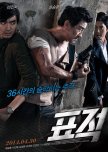
This review may contain spoilers
A Servicable, if not Below Average, Action Film
[Written/Watched Jan 04, 2021 for Letterboxd. Expanded 1/23/2021.]I watched "The Target" thinking it was "The Suspect", only to happen across the aforementioned film when I looked at Gong Yoo's filmography. By that point, I was in the process of reaching the end of this film (on Tubi) and decided to finish it.
"The Target" falls somewhere in the vein of "The Man From Nowhere" and "A Special Lady", but its not quite as violent or gripping as either film.
The film's premise is definitely interesting. It invokes the same kinda tension as "Nick of Time" (starring Johnny Depp and Christopher Walken), where a man's daughter is kidnapped and he's forced to participate in an assassination plot to save her.
Problem is, one half of the film's protagonist (Tae-Joon, a doctor) ultimately becomes a reactionary party to the kidnapper's brother (Yeo-Hoon), who Liam Nesson's his way through the film as it devolves into a revenge plot once the kidnapper (Sung-Hoon) is killed. It's almost comical how many times the Tae-Joon avoids death. Like, his plot armor is strong.
(And, no, it shouldn't be ignored that the film does rely on a level of abelism to drive the plot. Specifically how the character with tourettes (Sung-Hoon) is killed to motivate the protagonist (transforming him into a tragic figure of pity), and is called the hard R slur immediately afterward by the doctor.)
"The Target" is a serviceable action film with moments of sentimentality that don't quite land. I get what the film was going for, given the comparisons I've made, but it just never invests enough in the characters to deliver.
(Also, why was there a mid-credits ending to tie-off the fate of the villain? Were they expecting to make a sequel?)
Was this review helpful to you?
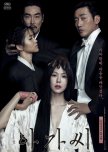
This review may contain spoilers
I Get why y'all Like this Film so Much
[Watched/Written 1/5/2021 for Letterboxd. Expanded 1/23/2021]There was a moment, at the end of Act I of "The Handmaiden" where I was seriously considering turning this film off. The expectation of a lesbian love story (within repressed boundaries) seemed entirely out of the question as the film followed the newly christened Tamako (Sookee, a name that unfortunately invokes True Blood's Sookie) as she and her partner-in-crime (Lord Fujiwara) prepared to swindle a absent-minded heiress out of her money.
I was like, "Oh, a heist film?" Poor folks robbing the rich and leaving 'em high and dry is my jam, and I was entirely convinced that Sookee was going to ride off into the sunset with Lady Hideko's money. So, imagine my surprise when I watched (gobsmacked) as Lord Fujiwara betrayed her.
The injustice of it all, I thought. I rated it, turned the television off and went to bed I was so salty.
Revisiting it in the morning, those thoughts quickly vanished as I watched film roll back the intentions under everything that happened in the first act, and do it so deftly, that I was left with only a sense of catharsis as Hideko and Sookee twisted their way out of the abusive dynamics they fell victim to, and secure a happy life for themselves.
I tend to avoid films like "The Handmaiden". The very name invokes so many ideas established around "erotic adultery" films (particularly their tendency to wander into the realm of rape-as-romance).
I was prepared to write it off as another exploitative smut-fest hiding behind a same sex relationship (ah-la "Blue is the Warmest Color"), a film without positive returns (i.e., a worthwhile story, with performances and directing to back it up, like "3-Iron"). But, like, yeah, I get why y'all like this film so much.
I hope Sookee and Hideko lived long and happy lives.
Was this review helpful to you?

This review may contain spoilers
A Solid Melodrama Hampered by Cenorship and Comrpomise
It's hard to believe that anyone watching "Better Days" would miss that the story was clearly critical (condemnatory) of the toxic culture around the education system. A system that suggests that you're weak for failing, and that it's all about not failing your parents. Not that it's own approach to learning has severely damaged its youth and their ability to empathize with their fellow peers.At least, that's how I interpreted the suicide (of Hu Xiao Die) that's the catalyst for the film. So the hard swerve into hyper-focusing on school bullying alone, and attributing the death solely to that (while there are giant signs condemning children for not being perfect in school, contrasted against security gates lining the school balcony) was tone deaf to me. "We just gon' pretend that the school system wasn't also responsible for this?"
Reading up the film (Hollywood Reporter) certainly clarified things for me. Chen Nian's story lost a lot of context with the removal of most of her mother's subplot, which seemed to tie her directly to way Liu Bei Shan made a living in the absence of his mother.
Still, even with all this knowledge at the forefront of my mind, I don't think the film in its present form is terrible (hoping a fool's hope that an uncut version surfaces at some point). Even if the film never condemns the education, or the parents, or the financial straits that lands Chen's mother in a bad place, their actions are a damning document on how it harms the children (who act out that trauma on their peers, driving them to death, until it's eventually visited upon them).
But I suppose that kind of messaging only works if the audience intended actually sees it for what it is (and from what I read about it, that flew over everyone's heads).
If the film falls off the rails, it's when it becomes about the sudden murder of the comically cruel school bully (Wei Lai) and how the two characters deal with it. As something buffered against the hyper nationalistic "we shall prevail" exam scene, it comes out of nowhere. When did this happen? Why was this considered important enough to dwell on, but not important to actually see happen on-screen?
We don't get explanation until the last hour of the film (it was an accident spurred on by rage, and the Wei Lai's inability to leave Chen alone). The structure, for lack of a better word, throws the pacing of the film off completely because it's looking to surprise the audience with a brief whodunit. This is something we should've seen in real time (chronological order). The rest of the film is a melodramatic drag race to the conclusion of the film that sees both characters arrested (like some moralistic twist straight outta the hayes code).
What holds the film up, for the most part, are the performances of the leads (Zhou Dong Yu and Jackson Yi), and the development of their kinship. I believed these two strangers would form a rocky friendship as a means of coping their toxic environments. But for a film that's two hours and some change, I don't feel like more attention was given to their dynamic.
However strong Yu and Yi's chemistry is, Chen and Bai's relationship feels rushed. A lot of the film was really hyper-focused on how Chen was terrorized by her peers, almost gratuitously. And if they wanted me to empathize with Wei Lai, why was more time not afforded to her side of the narrative instead of dumped at the end of the film?
I wish that the director (Derek Tsang) never pursued a release in mainland China, because its sounds likes the guy's work was put through the ringer of a completely avoidable situation.
Was this review helpful to you?
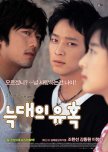
"Romance" is a Very Teen Drama 101 Story
[Written/Watched Sep 28, 2019 on Letterboxd. Expanded 1/21/2021]"Romance of Their Own" (unironically named "The Temptation of Wolves") is your usual bottom of the barrel (K-Drama) romantic fare for teens. (I have no doubts I would've loved this at fifteen or sixteen!)
Where the usual melodrama of a K-Drama would bring something to the table, the levels of saccharine high school antics that's played fatalistically straight here is a problem.
"Romance" isn't without its points. It's sense of humor (at times) is great, the schoolboy brawls can get brutal, but never fail to be entertaining. But the played-straight cool guy antics of the dudes (that would seem begin in a manga) fails to endear me to either male character. On top of that there's never been anything interesting about watching an indecisive teenage girl flip-flop over which jerk she wants be with in the end.
Soap operatic plot twists better suited for a television drama renders one of the characters ineligible in a story beat that just doesn't land the way the story thinks it should (you will roll your eyes). Teenage boys reducing girls to an object in an effort to determine who the best man is in the end, is irksome, and does nothing to add depth to the love triangle that dominates the film.
They grab her by the wrist, make decisions for despite her protest, and use other girls in an effort to make her jealous.. Other times they basically just abduct her in a show of manliness. It's all very nauseating, and I spent what little of the movie I watched (before I dropped it), wanting to whack both boys over the head with a bat.
Was this review helpful to you?

Stories about the dubious practice of the mail-order-bride system (marriage agencies) usually aren't my cup-of-tea. That "Dear Lena" dared to tackle the story of Russian-born Korean woman named Lena, and a farmer with aspirations to be a father, gave me certain ideas about where the story could've gone (that I'm glad it didn't).
As a slice-of-life story, "Dear Lena" merely explores how the title character adjusts to life in South Korea outside the context of Russia. It's not interested in being critical of marriage agencies, and even less interested in examining the controlling nature of the men in Lena's life.
Her relationship with her husband is largely portrayed as positive, with him wanting to do everything he can for her when he finds out she's sick. The film, at the very least, ends with her independence and freedoms recognized.
Was this review helpful to you?
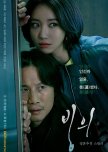
This review may contain spoilers
A Supernatural Drama that Loses Sight of its Strengths
I went into "Possessed" thinking it would be a buddy-cop comedy about and odd couple solving mysteries and helping (or fighting) ghosts. Something in the vein of USA's "Psych", or even TheCW's short-lived "Reaper". Despite its particularly violent and bloody opening, the show lived up to that comedic premise. Sort've.The jumpy, ghost-seeing cop, and the trendy shaman-in-training, worked great as a comedic dynamic. It was pretty easy to forget how the show started when so much of it was invested in the relationship between the show's leads. (As a friendship. Their dynamic just felt completely devoid of romantic chemistry.)
Additional humor, provided by the truly eccentric and exaggerated personalities of the supporting cast only worked to the show's advantage. "Possessed" had a solid grasp on its humor and angst at first. You never had too much of one or the other. But, this is a cop drama, and if "Voice 2" taught me anything, the show was only going to get progressively darker and violent (even if it wasn't warranted).
Somewhere between the fifth and sixth episode, the persisting story of the vengeful serial killer ghost began to drag the show down. As more focus was afforded to the cast's familial or romantic relationships, his mechanical plans and Doctor Tomoe cackling was altogether unwelcome. If "Possessed" was a Monster/Crook of the Week kind of show, I could see it striking the right balance with its cop and relationship story elements.
But the the overarching plot of "Possessed" overshadows everything that's good about it. It afforded the ghostly antagonist so much plot armor, the show stopped being entertaining and became a chore. The final stretch of the show feels like it was lifted from the 1998 supernatural thriller, "Fallen" (starring Denzel Washington and John Goodman), right down to who makes the big sacrifice to stop the bad guy.
Like others have said, "Possessed" went off the rails when it decided to kill the entire cast within the span its last of five or six episodes. It was melodrama for the sake of melodrama. How hard can our cast cry, how loud can they scream in dire situations? None of it was earned, none of it made sense (but I'm noticing a lot of procedural, terminal-illness, or horror dramas follow this pattern a lot!). The show wrote itself into a corner with the constant power boosts of the antagonist and the general ineffectiveness of its heroes.
Overall, when it wasn't focusing on the murderer spreed ghost, the show was pretty fun. "Possessed" has its moments and it's sure to hit right with others, but it just crumbled toward the end for me.
Was this review helpful to you?










